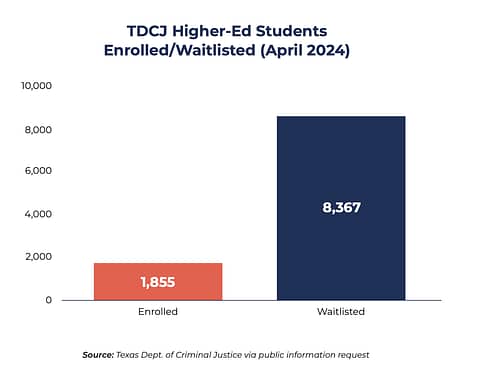Access to postsecondary education isn’t just valuable for students in traditional classrooms, it’s essential for those within Texas prisons where it can reshape lives, boost public safety and enhance economic growth.
Texas prisons house more than 134,000 individuals, and each year over 45,000 reenter society. Within three years, nearly half are rearrested, and 15-20% end up incarcerated again, at a cost to Texas of over $585 million every year. But it doesn’t have to be this way.
The most recent academic studies indicate that incarcerated individuals who participated in college-level education programs are as much as 41.5% less likely to recidivate, and investments in prison college programs demonstrate a $1.61 return for every $1 spent.
Expanding postsecondary education programs in Texas prisons could reduce recidivism rates and give the formerly incarcerated a path to stable, productive lives — a benefit that extends to their families and communities. Employers are also more likely to hire those with postsecondary credentials. A national study found that employers are 42% more likely to hire someone who was incarcerated with a college credential over a GED. Access to education creates career pathways for those trying to rebuild their lives.
 In a first-of-its-kind analysis, Texas 2036 reviewed data from institutions of higher education with students who are incarcerated in a correctional facility. A primary finding was that Texas has seen a 50% decline in incarcerated Texans enrolled in college programs over the past decade, from 7,203 in 2011 to just 3,581 in 2022.
In a first-of-its-kind analysis, Texas 2036 reviewed data from institutions of higher education with students who are incarcerated in a correctional facility. A primary finding was that Texas has seen a 50% decline in incarcerated Texans enrolled in college programs over the past decade, from 7,203 in 2011 to just 3,581 in 2022.
This drop isn’t for a lack of interest among incarcerated Texans; it’s due to limited capacity within the Texas prison system. The data shows that in April 2024, only 1,855 students were enrolled in TDCJ higher education programs, while 8,367 were waitlisted.
These findings were shared with the Texas Sunset Advisory Commission and echoed by the Sunset Commission’s conclusion that the Texas Department of Criminal Justice (TDCJ) “is unable to dedicate sufficient resources to effectively administer the postsecondary education program and capitalize on expanded [funding] opportunities.”
 The results of this research were published in the November 2024 report, Opening Doors: The State of Higher Education in Texas Prisons, along with a set of specific recommendations for improving governance and coordination among the schools and agencies responsible for providing educational opportunities within the Texas prison system. Those recommendations included better leveraging community colleges, enhancing data collection and sharing, and aligning prison education programs with state workforce goals.
The results of this research were published in the November 2024 report, Opening Doors: The State of Higher Education in Texas Prisons, along with a set of specific recommendations for improving governance and coordination among the schools and agencies responsible for providing educational opportunities within the Texas prison system. Those recommendations included better leveraging community colleges, enhancing data collection and sharing, and aligning prison education programs with state workforce goals.
This research informed the Texas Legislature’s deliberations on Sunset legislation concerning the TDCJ and the broader adult corrections system and higher education legislation providing dual credit to incarcerated Texans at no cost. It also informed legislative efforts to allow prisoners to apply for a provisional occupational license while awaiting release, thus reducing the potential lag time between release and employment, which can provide stability and reduce the likelihood of recidivism.
Legislation informed by Texas 2036’s work also expands opportunities for educational programs in Texas prisons. This addresses existing demand in a way that improves oversight and accountability, ensuring state resources are used in ways that yield positive outcomes.
For the first time, Texas has codified governance and coordination of higher education in its prisons, establishing a strategic plan for expanding and evaluating opportunities and cultivating engagement with key stakeholders to ensure program success.
Lawmakers began by assigning responsibility for the administration of higher education programs in Texas prisons to the Windham School District, one of the largest correctional education systems in the United States, and establishing an advisory board to help Windham oversee and administer programs. The legislation also requires robust data sharing between Windham, TDCJ, THECB, and TWC to evaluate program effectiveness and ensure that offerings are aligned with state workforce goals and employer needs.
